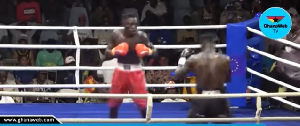- Home - News
- TWI News | TV
- Polls
- Year In Review
- News Archive
- Crime & Punishment
- Politics
- Regional
- Editorial
- Health
- Ghanaians Abroad
- Tabloid
- Africa
- Religion
- Election 2020
- Coronavirus
- News Videos | TV
- Photo Archives
- News Headlines
- Press Release
General News of Sunday, 17 September 2006
Source: The Statesman
The Statesman retracts and apologises
Raymond Archer, Editor-In-Chief of The Enquirer, Robert Joseph Mettle-Nunoo, formerly Communications Director of the Prof John Evans Atta Mills Campaign Office and Alhaji Bature of Alhaji and Alhaji, a current affairs Radio Gold programme, have all denied any involvement in any meeting held at the residence of former President Jerry Rawlings, in the company of Grace Asibi, one of the suspects in the cocaine case.
They also denied discussing or strategising to use a particular newspaper to get Asibi a front page for a political spin.
On separate radio stations Friday, all the characters mentioned in The Statesman story denied the story, calling for proof or evidence from The Statesman.
But our sources, who we have no reason to doubt, insist the meeting did take place last Friday.
However, we are taking the unusual step of retracting and apologising to the parties involved, while cross-checking the information again.
Our story, published yesterday September 15, 2006, read as follows:
"Before she went public this week to say "my life is in dangerous," Grace Asibi had a strategic top secret meeting with former Head of State Jerry John Rawlings at his Ridge home.
"According to our sources, also at the meeting were high profile critics of the government, Alhaji Bature (Radio Gold), Raymond Archer (Editor-in-Chief of The Enquirer), Fiifi Kwetey (NDC Propaganda Secretary) and Rojo Mettle-Nunoo (former Communications Director of 2004 NDC flag bearer John Atta Mills).
"The secret meeting followed a controversial court order by the Serious Fraud Office to seize the assets of persons suspected to be associated with drug trafficking business. Two of those at the meeting, Ms Asibi and Mr Mettle-Nunoo, were among those whose assets have been frozen.
According to our sources, the issue of the court order was discussed extensively, with Ms Asibi receiving counsel from members of the gathering on how to deal with her predicament.
Days later she gave radio interviews expressing shock at the SFO action, adding that she was under police protection because her life has been put in danger by the police describing her as an informant.
The public response to the SFO action by Raymond Archer, one of Ghana's celebrated investigative journalists, was for his own newspaper to grant him a front page interview.
In part one of that story, Mr Archer told his readers, "I smell a cover-up, and I will tell the public and you all the shocking truth of why I think this SFO statement looks more like a cover-up. This statement may end up hiding the assets than freezing them."
Section 13 of the Serious Fraud Office Act, 1993 (Act 466) gives the Director of the SFO the power to direct the freezing of the assets and bank accounts of persons or organisations under SFO investigations.
SFO, which is responsible for investigating matters involving serious financial or economic loss to the State, has sought to explain the action last week to freeze the assets of several persons and companies by saying it was investigating tax evasion allegations.
This has, however, been criticised by some legal experts, including Alhaji Mohammed Mumuni, running mate to Prof Mills in 2004.
Most critics have described the move by the SFO as too little too late, since the individuals cited in the current cocaine saga would have received legal advice about the possibility of their accounts and assets being frozen, and so would have made moves to effect changes in the ownership structure of their assets or destroyed incriminating evidence."











